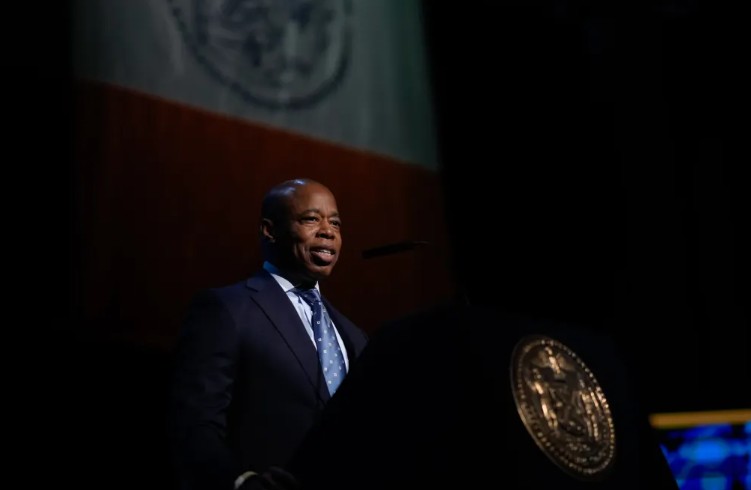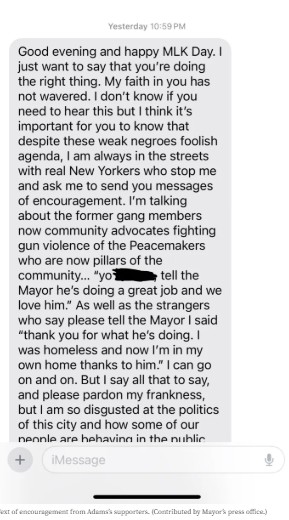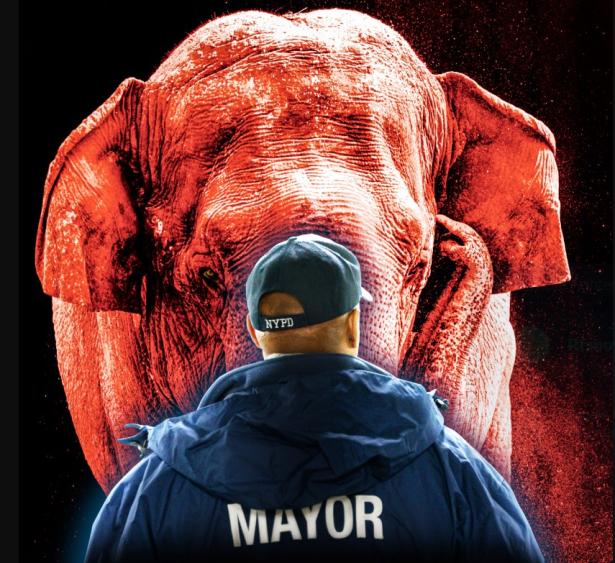At the beginning of his mayoralty, New York City Mayor Eric Adams was no stranger to critics calling him a “Republican,” among other things.
Plot twist: They might have had a point.
There are, of course, a number of reasons for why people are denouncing the Democratic mayor as a “sellout Republican,” but most recently, it’s the assumption that Adams is seeking a presidential pardon from President Donald J. Trump for his federal indictment on campaign fraud and bribery charges, which could yield jail time if he’s convicted.
Trump has pardoned rap stars like Lil’ Wayne and Kodak Black in the past. In a statement after a meeting in Florida with Trump, Adams said that they have not discussed his legal case and he has repeated that he doesn’t want to go to “war” with Trump.
Adams attended the second inauguration of Trump on Jan. 20, where he was “relegated to the overflow room with the likes of Jake Paul and Conor McGregor.” The next day, on Jan. 21, he sat for a lengthy interview at Gracie Mansion with former Fox News commentator Tucker Carlson. The conversation covered immigration, Adams feeling like he was abandoned by the Democratic party, the state of the city’s mentally ill and unhoused, and Adams’s indictment, none of which painted the Mayor as a loyal Democrat.
The Amsterdam News contacted electeds, analysts, and advocates in an attempt to understand Adams and his relationship with the Republican party better as he is set to go to trial in April. Raising the stakes this year are citywide elections, where the mayor’s job will be on the chopping block in the June primary.

Who Adams was
It’s well known that Adams was a New York City Police Department (NYPD) officer, supervisor, and advocate who co-founded 100 Blacks in Law Enforcement Who Care (100 Blacks) in 1995. Following in the footsteps of his mentors, he was outspoken about issues important to the Black community, including civil rights, social justice, and police brutality and killings. Adams’s organization was central to the 1999 protests over the shooting of Amadou Diallo, who was gunned down by four white members of the NYPD’s Street Crime Unit. Adams resigned as founding executive director of 100 Blacks in 2006 after being elected to the State Senate, representing Brooklyn’s 20th district.
Corey Pegues, president of Corey Pegues Enterprise, formerly incarcerated, a former NYPD officer, and a former member of 100 Blacks, recently interviewed Adams on his show, “Corey’s Corner.” He considers Adams a longtime friend, but thinks it’s “pretty obvious” that Adams is trying to garner favor from Trump to get a pardon.
“Am I mad? I don’t know, I’m not facing 25 years in prison, so I guess it’s good for him, but self-serving,” said Pegues. “The bad thing about that is he got a lot of his administration that’s under federal investigation. I mean, Ingrid got locked up, other people are probably going to get locked up, and he’s going to get off scot-free, which is crazy to me.”
Pegues identifies as a staunch Democrat. Overall, he believes that Adams committed crimes while in office and his leadership should be called into question. “ has actually done a 180 from what I know him as. I know people evolve as they age and time goes by, but to do a total 180 is pretty surprising to people that’s very close to him, that’s been with him for so many years,” said Pegues.
Who is Adams now?
The early days of Adams’s term as mayor were marked with a sense of hope and celebration, but that quickly gave way to criticism and spectacle. Instead of being largely recognized for his accomplishments, his time in office has been overshadowed by a federal investigation and historic indictment, sexual assault allegation, and number of senior city officials who have also been indicted or resigned. (To be fair, many New York City mayors were embroiled in their own scandals while in office, but narrowly escaped legal consequences.)
“In public corruption cases and ethical misconduct cases for city officials, bribery is way up there in terms of corruption cases. There’s a question of what the officials knew and did they knowingly break the law,” said Ben Weinberg, director of public policy for Citizens Union (CU). “You have to set an example with the people you appoint and with your own actions.”

According to a recent analysis by CU, former Mayor Bill de Blasio “skirted” campaign finance and ethics laws all the time, acted on behalf of donors who sought favors, and misused city funds and a police detail during his brief presidential run. Former Mayor Michael Bloomberg was a Democrat but ran as a Republican, later switching his party affiliation to Independent and then back to Democrat in 2019. Under Bloomberg, city payroll chief Joel Bondy resigned amid a huge fraud and corruption case against him. Former NYPD Commissioner Bernard Kerik was convicted for tax fraud and former Housing Development President Russell Harding embezzled taxpayer money during former Mayor Rudy Giuliani’s time. The late David Dinkins, the city’s first Black mayor, made it out with little scandal involving himself, but was in office when the head of his Office of Management and Budget (OMB) Philip Michael was forced to resign amid a bribery scandal.
For Adams, Weinberg found that “twice as many” city leaders were indicted or resigned than under the past four mayors combined. He said this “troubling trend” underscored the urgent need for reforms to the city’s ethics laws, conflict-of-interest rules, and appointment procedures for senior officials.
Republican versus Democrat
According to John Ketcham, a fellow at the Manhattan Institute for Policy Research, a conservative think tank focused on domestic policy, 2024 presidential election data showed that New York State and New York City voters swayed more heavily Republican than in previous years, and that former President Joe Biden’s “failure to address the effects of the migrant crisis” contributed to that.
Much of Trump’s gains relative to 2020 came from majority Hispanic and Asian neighborhoods, Ketcham said, areas that experienced the effects of the migrant crisis through “street prostitution, trafficking, unlawful street vending, and other forms of visible disorder.” He added that other factors, like skyrocketing housing costs and serious crime levels, also led to a Trump vote over former Vice President Kamala Harris.
Ketcham also acknowledged that the city and state’s Democratic Party does not speak with one voice. “This split personality is partly a consequence of the state’s closed party primaries,” said Ketcham. “Political competition in the city effectively occurs between factions of the dominant Democratic Party, rather than as competition between parties.” There’s certainly a wide range of reactions to Adams and Trump from fellow Dems.
The City Council’s Progressive Caucus, headed by Councilmembers Shahana Hanif and Sandy Nurse, said in a joint statement to the mayor’s Carlson interview: “Good riddance.”
Reginald T. Brown (pronouns they/them), a socialist Democrat and board chairperson for VOCAL-NY, is adamant that many high-level Democrats in New York, including Governor Kathy Hochul, are “corporate” and not for the people. Brown denounced Democrats who work with Republicans, such as the Independent Democratic Conference (IDC) that was disbanded in 2018.
Adams was Brown’s senator when they lived in Brooklyn. To Brown, Adams and Trump are “twins” in terms of their attitudes and a strategic “cozying up to billionaires.” Brown said they didn’t support Adams then and won’t now. “It was nice having a Black man [in office], but that doesn’t necessarily mean anything. Just like having a Democrat doesn’t necessarily mean anything,” Brown said.
Queens Councilmember Robert Holden, a common-sense Democrat, said that it’s “encouraging to see Mayor Adams adopting a more common-sense approach to immigration.” He hopes Adams stays focused on following through with these ideas and delivering real results for the people of New York.
Adams has run and won on the Democratic ticket for mayor, Brooklyn borough president, and four times as senator for Brooklyn. However, it is not as widely known that he has registered as a Republican at least once in the city, and because of his background in law enforcement, has campaigned and legislated from a centrist-to-conservative view on crime reduction and bail reform.
In the past week since the Carlson interview, Adams has had a limited public schedule because he “hasn’t been feeling his best” and has a slew of doctor’s appointments. His press office said despite what’s going on, “he has been clear that he is running as a Democrat” in the upcoming election.
As mayor, Adams enjoys high name recognition and still has significant support among Black voters — a 40% favorability rating, according to a poll conducted earlier this month, said Ketcham. The mayor has gloated lately about his base of loyal Black and Brown/working class voters, even circulating “texts” from them as proof. “I don’t know if you need to hear this,” read one sent to the AmNews by the mayor’s press office, “but I think it’s important for you to know that despite these weak negroes foolish agenda, I am always in the streets with real New Yorkers who stop me and ask me to send you messages of encouragement.”
The downside is that assumed mayoral candidate former Governor Andrew Cuomo shares much of the same voting base as Adams. Cuomo also has widespread name recognition and a reputation for effectiveness through ruthlessness. They are likely to split most of the city’s minority and moderate vote even with ranked choice voting, said Ketcham.
“Many of Adams’s supporters have discounted the indictment on the grounds that it was motivated by a retaliatory Biden Department of Justice or that it was for relatively minor offenses like hotel room and plane upgrades,” said Ketcham. “Given the mayor’s high unfavorability numbers, securing a presidential pardon may only have a small effect on his electoral chances.”
There’s still a chance that Adams could lose the Democratic primary and then run as the Republican candidate in November’s general election, based on the state’s obscure Wilson-Pakula law, which allows Adams to seek authorization from the Republican Party to run in its primary. Having the backing of Trump could pressure the state party to allow Adams to run, said Ketcham, and considering that no plausible Republican primary candidate has emerged yet, Adams might be Republicans’ best chance of winning.
Pegues said that Adams was a golden child of the Democratic party at one point and everyone truly did want to see him succeed. Now, he doesn’t think that Adams will have a “chance in hell” of getting re-elected. Even if he continues to be friendly with Trump and Republicans, Adams eventually will have to defend the city from Trump’s orders or face the wrath of voters. He pointed out that Black MAGA Republicans, like U.S. Senator Tim Scott, didn’t receive any high-level appointments in Trump’s administration.
“Donald Trump is who he is and he tells you who he is and he is what he is,” said Pegues. “He is straight-up, ‘you either bow down to me and kiss the ring, or you’re finished.’”
[Ariama C. Long is a reporter for the New York Amsterdam News in New York City, covering local politics, city council and city agencies.]


Spread the word